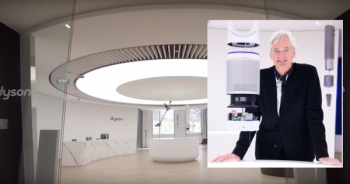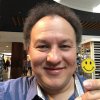If Dyson ever decided to get into smartphones, Apple might actually get worried for once about having some real competition.
The same could be said if the situation was reversed, and perhaps the future one day heralds an Apple/Dyson alliance or acquisition, but until then, both companies are technological examples of excellence that deliver the goods and the profits as competitors quiver.
To ensure the pipeline of products and productivity proceeds powerfully, continual investment in the future is needed to transform ideas into reality, and that’s what Dyson is doing in Singapore.
|
|
The company’s eponymous founder, Sir James Dyson, made the announcement earlier this week of its new Technology Centre in Singapore, with the country’s Minister for Trade and Industry, S. Iswaran, in attendance.
Dyson proudly boasts it is investing £330m in its future in Singapore, noting its new facility "has the latest development labs, bringing together the latest hardware and software expertise".
The company explains that it "plans to grow the Singapore-based engineering team by 50%", and that its facility is "located in the heart of Singapore’s start-up community and next to the National University of Singapore,’ helping Dyson’s engineering teams to focus on ‘developing new technologies for the future".
Sir James stated: “It is no coincidence that we are deepening our investment in Singapore to achieve our technology ambitions. Right here, some of the world’s brightest minds are working on artificial intelligence, machine learning, robotics, fluid dynamics, vision systems to bring hardware, electronics and software together.
"Good software allows Dyson products to actually improve over time and gives them intelligence to understand and respond to their environment.“
Reminding us of the seriousness with which it takes R&D, the company says it "invests £7m a week in research and development and employs 3,500 engineers and scientists globally".
It also notes that it has "1100 people in Singapore split between its Technology Centre at Science Park I and its advanced digital motors manufacturing facility at West Park".
Think you can help create the future and make the world a better place? Then you’ll be pleased to know that "Dyson is seeking highly skilled engineers across a broad range of engineering disciplines including connectivity, motors, sensors, electronics, robotics, navigation, software and purification", and given the plans to grow the Singapore-based engineering team by the aforementioned 50%, they’re clearly going to be very busy.
As you’ll see in Sir Dyson’s speech below, there are 200 vacancies (including software engineers) in Singapore alone and another 110 Dyson vacancies for software engineers in various markets across the globe, both open to applicants worldwide.
Here’s a video of the new Technology Centre in action, the rest of the article continues below, including a transcript of Sir Dyson’s speech.
Dr. Beh Swan Gin, chairman of the Singapore Economic Development Board, said: “We are pleased that Dyson is expanding and deepening its presence to Singapore. With its focus on connected technology and intelligent machines, Dyson’s Singapore Technology Centre will create exciting jobs in areas such as artificial intelligence, machine learning and software development.
“This will in turn, inspire young Singaporeans about the transformational possibilities of engineering, and support our drive to build an innovation-led economy.”
‘Control Tower’
Dyson also notes that it "sells more than 13 million machines in 75 countries globally, using 4bn components from more than 500 suppliers", and that "volumes have doubled over the past four years, and are expected to double in the next four".
We are told that "the Control Tower at the Centre displays real-time supply chain and logistics data to respond to events as they happen and to mitigate risks in its supply chain".
Jim Rowan, Dyson’s chief operating officer, said, “As the way people shop is changing so to is our supply chain. The Dyson Control Tower connects our entire supply chain. Using the latest technology, it tracks real time machine reliability and delivery performance ensuring the highest quality products reach our customers on time.”
Then there’s ‘West Park’
The company notes that its new Technology Centre is "30 minutes from West Park, where one of Dyson’s patented digital motors comes off the production line every 2.6 seconds".
Drawing on Singapore’s expertise in advanced autonomous production, the company says its "line relies on precision robotics to manufacture the high speed electric motors. The V9 is Dyson’s smallest motor to date, spinning at 110,000 rpm. V9 is able to move over 13 litres of air through the diameter of a 2p coin, just 27mm, every second".
So, what is Dyson’s history in Singapore?
Here’s the short version:
2007: Dyson opened its first facility at Science Park I with a small team of engineers to support the transition of projects from design to manufacture.
2009: The Singapore development facility moved to a 3,000m² site at Alexandra Technopark, growing its headcount by 700%.
2012: Dyson officially opened its advanced motor manufacturing facility in West Park in January.
2013: Dyson announced an additional S$100m investment into West Park.
2015: Dyson invested another S$100m into West Park, including a new line to manufacture the V9 motor that can be found in the Dyson SupersonicTM hair dryer.
2016: Dyson made its 20 millionth digital motor in West Park in September and moved into the Singapore Technology Centre in December.
2017: Dyson opens new Singapore Technology Centre at Science Park I.
There’s also a shortage of engineers in the UK
Here, Sir James says he’ll invest "£15 million over the next five years to tackle head-on the dearth of skilled engineers in the UK".
We are told that "Britain will need an extra 640,000 engineers by 2020 which is limiting Dyson’s ability to meet its ambitious recruitment needs".
Sir Dyson explains that he "plans to offer the brightest aspiring engineers a relevant alternative to a traditional university degree by establishing the Dyson Institute of Technology on Dyson’s UK Campus".
"The new degree will combine academic learning with hands-on experience developing Dyson products and working alongside Dyson’s engineering team. The students will come away from higher education debt-free, having earned a salary throughout, and with the prospect of earning a full graduate wage on completion of the four-year programme."
Announcing his plans for the Institute, Sir James said: “The UK’s skills shortage is holding Dyson back as we look to increase the amount of technology we develop and export from the UK. We are taking matters into our own hands. The new degree course offers academic theory, a real-world job and salary, and access to experts in their field."
And before we get to Sir Dyson’s speech, what is the snapshot of Dyson’s results globally in the recent past?
The company says that, in the past four years, its "revenue has more than doubled and Dyson’s technology investments have tripled, with its products sold in 75 markets globally". By 2020, Dyson says it "aims to hire another 3,000 engineers globally".
In September 2016, Dyson opened its new £250m 56-acre Technology Campus in Wiltshire, England. The new facilities provide 129 laboratories for future product development, with more than 200 live technology projects as well as 50 active research programmes with 40 universities around the world.
The Campus employs 2500 Dyson people, and will be home to the Dyson Institute of Technology when it opens in September 2017.
Here now is the speech Sir James Dyson gave at the opening of its new Singapore Technology Centre:
“It is an honour to welcome Minister Iswaran, and those of you from around the world, to our newest Technology Centre.
"It is just 10 years since we began in Singapore with a small, focused engineering team. Our task was to develop, and make, the world’s first high speed, digital, electric motor. We chose Singapore, because it's one of the few nations with the skills, and supply chain, to make such a complex motor.
Take the smallest of our motors, the Dyson V9. It spins at 110,000 RPM: that is eight times faster than other equivalents and it is half the weight. It sits at the core of the Dyson Supersonic hair dryer. It is quiet because it spins at ultrasonic speeds. It fits in the handle, rather than the head, to provide balance in the hand. It required four years of intensive R&D and £50m of investment. The motor has enabled us to fundamentally rethink an everyday product.
The precision required for ultrasonic motors, means that they can only be assembled on robotic lines. The equipment is so precise that it's classified as weapons grade. It required special export permissions. We now make 13 million motors a year at Westpark.
It is no coincidence, that to realise our technology ambitions, we are deepening our commitment to Singapore. You have some of the world’s brightest minds. Working together, we hope to make more breakthroughs. New technology, will catapult us forward, just as the Digital motor has done.
As well as being a precise piece of hardware, this motor is packed full of algorithms and code. It is a fact, (very much under the radar), that software is propelling hardware companies.....at a faster rate, .....than software is propelling software companies. The power comes from the two working together. Our interests are therefore broad: artificial intelligence, machine learning, hardware and software, robotics, fluid dynamics, vision systems, battery cells, super capacitors, acoustics – the list goes on.
Dyson is focused on developing intelligent technology. We are making products which know and anticipate what you want, before you do. This 'machine learning' gives our products the intelligence to understand and react to their environment. This is central to our future. We are on a hunt for the brightest minds.
Singapore understands, and values, the contribution engineers make to society. Importantly, you have graduates with highly skilled minds.
Singapore’s Prime Minister Lee said “Engineering matters for Singapore’s future”. It is refreshing to hear these words from such a high profile voice.
I believe that engineering matters for everyone’s future.
The world is gripped by a global technology race.
Only engineers can solve the most significant problems: It has been known for some time that vehicle pollution from internal combustion engines is toxic. Air pollution affects everyone – even wonderfully modern cities like Singapore. It is engineers that will rid our planet of dangerous pollutants and indeed prevent them being there in the first place.
This Centre is part of that battle. We are developing our next generation of connected air purification technology. This keeps the air in our environments clean. In addition, we are researching battery and electric motor technology, which will contribute to a cleaner energy future.
Robotics are another other global opportunity. They have the power to transform cities, homes and workplaces; improving lives in the process.
Dyson’s vision system for robotics allows our autonomous vacuum cleaners to see and to understand their environment. The machine interprets its own 360 degree movie to know where it is, where it has been, and where it is yet to go. It forges complex hardware and software, to create an intelligent, high performing machine. It’s cleaning power is down to its Singapore digital motor.
We believe in engineers and in revolutionary technology. We invest in both, and back them with a supportive environment. Ultimately, 'success' requires long-term investment, an international outlook, and a political agenda that understands this philosophy.
Singapore is quite clearly at the forefront, and ambitious for the future. Dyson is ambitious also.
I am very grateful for the support from the Singapore government and the EDB. It’s going to be both exciting and creative.
"Thank you.”








































